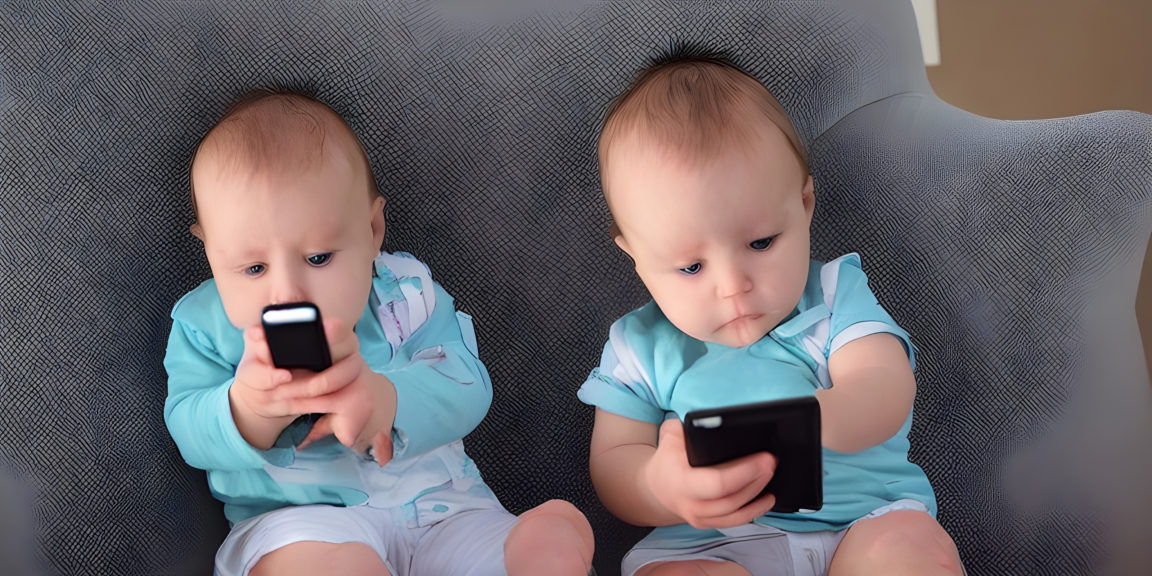CEO and cofounder of global market research company Josh LaMar recently posted the following commentary on an article about newly published paper. The article titled “Infant Screen Use Leads to Reduced Cognitive Skills at Age 9” prompted Josh to write
“It’s scary to think that only now is the data starting to come out about this.
We never know exactly what the impact of new technology will be on us
And this is a good reminder to be cautious about how and when we integrate technology into our lives.”
Contents
Why infant screen time is important to me
This is REALLY interesting to me. I am a science communicator who writes and teaches about the dangers of new products on the market, giving dozens upon dozens of examples of disasters. I have a Master’s of Science in Marketing, a CELTA teaching certificate, and a Washington State CTE Teaching Certificate. My teaching experience to children is mostly ages 7-18. I am also a parent of a 7mo and 21mo.
My husband and I decided to have a zero screen time policy for as long as possible, with one exception – showing the kids videos of themselves while we are cutting their nails. We wish photos were enough, but they just don’t cut it.
I’m also just as susceptible to the temptation to judge* as everyone else.
I have conversations with parents, teachers, and medical and scientific specialists all the time about the very subject of screen time. I dug deep on this article. Here are some of my highlights from reading the article, the paper, and other papers referenced.
Critical thinking is for everyone
I love the criticisms raised by the article author Jakob Nielsen, PhD and usability expert. I especially appreciate how he highlights how the cohort was recruited in 2010, before tablets became mainstream. I’m sure the apps have only gotten better at targeting infants. That’s the fascinating thing about dangerous products – the lag time between introduction and the data about the repercussions coming in. Read his short and easy to read article for an excellent example of simple critical thinking we can all do.
Who leans on screens? Education and affluence helps
The original scientific paper referenced a really cool 2021 paper titled “Associations among average parental educational attainment, maternal stress, and infant screen exposure at 6 months of age” (Wiltshire et al 2021). It concluded that
“Average parental educational attainment, but not maternal stress, was significantly associated with initial infant exposure.”
As a stressed parent, I find comfort in knowing that other stressed parents are not the ones who are leaning on screens to help them cope. This knowledge, and let’s face it, my own superiority complex, motivates me to tough it out.
“Homes characterized as lower-income tend to consume, on average, two hours more daily screen time than their more affluent peers…Children whose parents obtained no more than a high school education tend to view screens, on average, 1.5 h more per day than children of college-educated parents (Rideout & Robb, 2020)”
Sadly, my degree doesn’t directly help blood pressure, as Wiltshire et al 2021 concluded that “education was not associated with perceived stress”.
Not making it easy for yourself to fall into the screen time trap
In our household, we believe that nobody plans to drive drunk, but if you put yourself in a position where you are more likely to do it, such as by driving to a venue where excessive alcohol consumption is likely, you are not doing yourself any favors. We have taken this approach to child-rearing, and how many dessert choices we stock in the house.
“Of those families who endorsed screen exposure by 6 months, 70 % reported a screen in the room where the child sleeps, nearly half reported using screens to help calm the infant, and about a third reported using a screen at least sometimes during meals, when going to sleep, and while waiting. (Wiltshire et al 2021)”
This further cements our decision to hold out on buying a device for our children.
The paper gives other screen uses, like being a “babysitter” such as when they are used to occupy a child’s attention in the absence of the adult caregiver. Even adult usage is an issue.
“Research demonstrates that parental use of screens while in the company of young children can serve as an impediment to the relationship [and interactions] between a parent and a child…explained more comprehensively as “technoference” (McDaniel, 2015)”
Mind you, we do own a TV, despite the fact that this pretty good working paper concluded that under their conservative estimate “television ownership is associated with approximately a 6% reduction in the likelihood of having had sex in the past week”. Be sure to bring this up next time you walk into a house without a TV.
*A note on being judgemental
One takeaway from speaking to other parents is that it’s very much a matter of picking your battles. Unless you have the budget for a cleaner, nanny, cook and night nurse, you can’t have zero screen time, a clean and polished household, a plethora of extra-curricular classes and activities, home-cooked organic meals, an active social life…
We have chosen what to prioritize at the expense of other things other families do better. We see families who have made decisions other than the ones we have made, and see them as exactly that, just as I hope anyone who sees my diet and exercise routine and does the same.
To quote Dr Becky, author of Good Inside
what is my most generous interpretation?
Furthermore, I acknowledge my own issue with being on my phone in the presence of my children. I’m working on it, and any advice on this is most welcome.
What does your family do?
I love learning about what other families do. What boundaries have you or people you know set? What are the exceptions? What else is in your toolbox? What do you take pride in? And what fell by the wayside, despite your best intentions? (For us, it’s the barely-used food mill for making homemade baby food. 😂) Comment below, or reach out.
Further reading
Our own category tag on goodbadmarketing.com for “dangerous products”.
AI Acknowledgement:
This article was 100% human written and researched. The preview text metadata was based on a summary written by ChatGPT.
The header image was created using DeepAI with the prompt “6-month-old addicted to a cell phone”.





